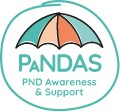Neurodiversity information for parents and young people
Any parent can struggle emotionally during and after pregnancy.
This page provides information about:
- NHS Talking Therapies,for anxiety and depression
- PANDAS charity, supporting parents during and after pregnancy.
Emotional problems are common
Having a baby can be joyful, exciting and rewarding. However, it is also common for pregnant women and new parents to have anxiety, depression or emotional distress.
Up to 1 in 5 women experience emotional difficulties during pregnancy and in the first year after their baby’s birth. This can happen to anyone. It is not your fault.
It is common for pregnant women and new parents to experience:
-
low mood, sadness and being tearful
- anxiety, worry and tension
- being irritable and anger
- difficult or unexpected feelings towards your pregnancy or baby
- poor sleep even when your baby sleeps well
- feeling unable to cope or enjoy anything
- thoughts that you are not a good enough parent
- worrying thoughts about your baby
- anxiety about labour or struggling to come to terms with a difficult labour.
Ask for help
It can be difficult to talk about how you are feeling and ask for help.
Common reasons for this are:
- you may not know what is wrong
- you may feel ashamed that you are not enjoying your baby or coping as you think you should
- you may worry that your baby will be taken away.
Asking for help doesn’t mean you cannot cope or are not able to care for your child. It is the start of getting the right help and support to ensure you can be the parent you want to be.
It is very rare for babies to be taken away from parents, so do not worry about this.
What help is available
If you live in England and are aged 18 or over, you can access NHS Talking Therapies services for anxiety and depression.
The NHS now offers a Talking Therapies service. This gives free, confidential talking therapy for people who have symptoms of anxiety or depression.
The service gives priority to pregnant women and new parents.
How it can help you
The Talking Therapies service offers short-term talking therapy to give you space to talk.
The types of therapy offered will depend on what you need and what is available in your area. These may include:
- guided self-help sessions with a therapist
- cognitive behaviour therapy
- couples therapy
- counselling.
How to contact Talking Therapies
You can refer yourself to the Talking Therapies service. Contact details for all London services can be found online.
You may find it hard to contact us yourself. In this case, ask your midwife, health visitor, friends or a family member to help you make that first call. Your GP can also make the referral.
We know that pregnancy and the first year of your baby’s birth is a very important time. We will offer you an assessment and treatment as soon as possible.
What to expect
When you first telephone, we will ask you for some brief details.
We will then arrange a time for you to speak to one of the therapists. This appointment will be booked as soon as possible, usually within a few days.
The first appointment is to find out about your current difficulties. This helps us decide how we can best help you. At the end of the appointment, we will discuss the support options available and agree a plan.
The service aims to be flexible. We want to make it as easy as possible for you to get the help you need. You can often bring your baby to sessions if you want to.
Services usually offer you a choice of locations for your appointment, sometimes in antenatal clinics or children’s centres.
PANDAS is a charity that offers help and support for parents affected by mental health problems during and after pregnancy.
Their website has information about PANDAS support services. These include help via phone, WhatsApp, email, social media and support groups.
Free helpline: 0808 1961 776
Contact information
Contact your midwifery team if you need further advice or support. The number is on the front of your hand-held notes.
Go to your local Emergency Department (A&E) or dial 999 if you need urgent help with how you are feeling.